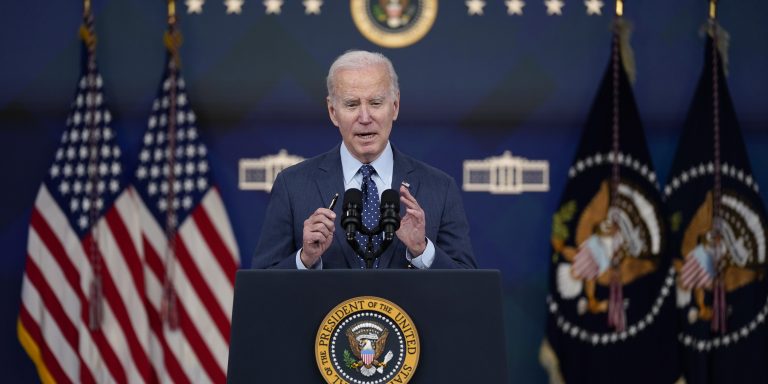INTELBRIEF
March 1, 2023
IntelBrief: A “Biden Doctrine” for the Middle East

Bottom Line Up Front
- A top U.S. policymaker on the Middle East, Brett McGurk, this month articulated a “Biden Doctrine” consisting of major principles guiding U.S. policy toward the region.
- Notably omitted from the doctrine was a potential U.S. response to Iran’s increasingly viable nuclear weapons program or mention of regional counterterrorism operations.
- The doctrine aggregates policy initiatives implemented by successive U.S. administrations over the past several decades.
- The policy statement sought to reassure critics that U.S. policy is based not only on strategic, political, and economic factors but also on upholding human rights and providing humanitarian aid.
In a February 14 speech, White House Coordinator for the Middle East and North Africa Brett McGurk articulated what he termed a “Biden Doctrine” to guide U.S. engagement in the Middle East. This new framework was presented by U.S. President Joe Biden to Arab leaders during his July 2022 visit to Saudi Arabia, according to McGurk. The doctrine, which has been incorporated into the U.S. National Security Strategy, appeared to represent an attempt to tie together seemingly disparate U.S. actions and operations in the region into an overarching framework via five underlying principles: partnership-building, deterrence, diplomacy, integration, and values. While these principles have been featured prominently in U.S. policy toward the region for decades, the omission of any reference to U.S. efforts to counter terrorist groups operating in the region would represent a sharp turn away from two decades of U.S. policy emphasizing fighting terrorist groups with global reach, such as al-Qaeda and Islamic State.
The presentation was perhaps the first attempt to articulate a regional strategic vision by the United States since the George W. Bush administration framed U.S policy in terms of establishing democratic governments in the region that would deny safe haven and ideological traction for Islamist terrorist groups of global reach in the aftermath of 9/11. Prior to Bush, the Clinton administration articulated a “dual containment” strategy targeting both Iran and Iraq, while the “Carter doctrine” came in response to the 1979 Iranian revolution and the Soviet invasion of Afghanistan.
While the first component of the Biden doctrine is building regional partnerships and providing these partners with defensive capabilities, the provision of military advice, training, and sales of sophisticated weaponry to Israel and key Arab states has been a cornerstone of U.S. policy since the 1960s. While the new doctrine emphasizes partnering with “countries that subscribe to the rules-based international order,” U.S. partners like Saudi Arabia and its ally the United Arab Emirates (UAE) can be said to have defied such rules by initiating a boycott and blockade of Qatar in 2017 and by causing substantial civilian casualties in Yemen, for example.
The doctrine’s deterrence element, which according to McGurk, is focused on upholding freedom of navigation through Middle East waterways like the Strait of Hormuz and Bab al Mandab and denying any country the ability “to dominate another or the region through military buildups, incursions, or threats.” In his speech, McGurk pointed specifically to Iran and its proxy forces as key targets of deterrence by the U.S. and its regional partners. The general concept rings similar to the core declaration of the Carter Doctrine, which threatened to respond with force to any attempt by the Soviet Union or other major power to gain control over Persian Gulf oil supply. However, McGurk’s speech did not address what actions, if any, the United States is prepared to take if Iran continues to draw closer to achieving a nuclear weapons capability, as it has done since the Trump administration pulled the United States out of an agreement that incentivized Iran against enriching its uranium stockpiles. Earlier last month, the country reportedly reached uranium enrichment levels of 84 percent, six percent shy of what is necessary for weapons-grade uranium.
Beyond deterrence, McGurk describes U.S. diplomatic doctrine as reducing tensions, de-escalating, and ending conflicts “whenever possible.” In the past, U.S. diplomats have had their hands in attempts to resolve the Israeli-Palestinian conflict and the ongoing conflict in Yemen, mediating peace settlements between Israel and both Egypt and Jordan, efforts to hold long-delayed elections in Libya, and the relaxation of sanctions on Iran as part of the 2015 nuclear deal. Yet despite McGurk’s claim that U.S. diplomacy has helped make the Gulf Cooperation Council “more united than … ever,” tensions remain even after the 2021 resolution of the Saudi Arabia/UAE-led boycott of Qatar.
The doctrine’s tenet of integration, defined by McGurk as the interlinkage of U.S. partners via “political, economic, [and] security connections,” appears to represent an institutionalization of the 2020 “Abraham Accords,” under which the United Arab Emirates (UAE) and Bahrain normalized relations with Israel and have since expanded their security, economic, and cultural relationships aimed at countering Iran. Morocco and Sudan joined the effort subsequently. Yet the U.S. brokering of and commitment to the Accords, which was seen to undermine the 2002 Arab peace agreement that predicated normalizing relations with Israel upon establishing “just settlement” between the Jewish state and Palestine, has called into question the country’s longstanding stated commitment to a “two-state solution” between Israel and the Palestinians.
In a nod to criticism that U.S. policy in the region favors economic, political, and strategic interests over human rights issues, McGurk sought to affirm U.S. fealty to the promotion of “human rights and the values enshrined in the UN Charter.” He pointed to the United States’ status as the region’s “largest bilateral donor of humanitarian assistance,” emphasizing its involvement in the recovery efforts underway in Türkiye and Syria following the recent earthquake. Yet this fifth principle is, to some extent, contradicted by the “partnership” tenet of the policy that calls for U.S. alliances with governments, including that of Egypt, Saudi Arabia, and others that are widely cited for systematic human rights abuses. Whether the various principles of the Biden Doctrine synchronize or contradict each other will become clearer as the policy’s implementation continues to unfold.